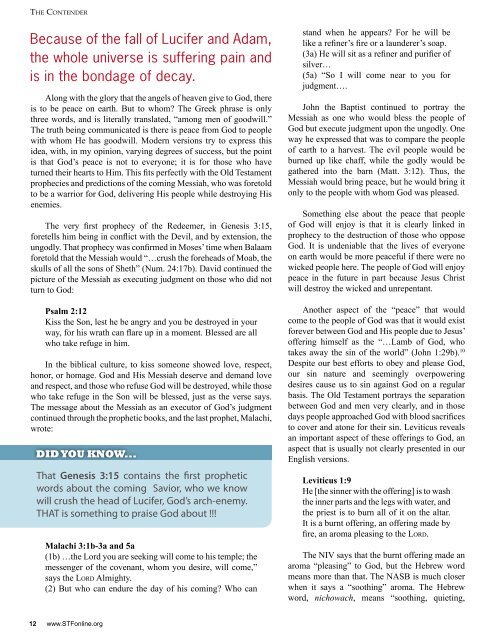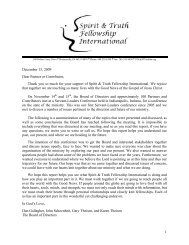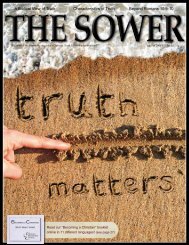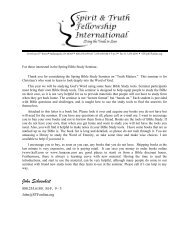Glory in the highest heavens to God... - Spirit & Truth Fellowship ...
Glory in the highest heavens to God... - Spirit & Truth Fellowship ...
Glory in the highest heavens to God... - Spirit & Truth Fellowship ...
You also want an ePaper? Increase the reach of your titles
YUMPU automatically turns print PDFs into web optimized ePapers that Google loves.
Th e Co n t e n d e r<br />
Because of <strong>the</strong> fall of Lucifer and Adam,<br />
<strong>the</strong> whole universe is suffer<strong>in</strong>g pa<strong>in</strong> and<br />
is <strong>in</strong> <strong>the</strong> bondage of decay.<br />
Along with <strong>the</strong> glory that <strong>the</strong> angels of heaven give <strong>to</strong> <strong>God</strong>, <strong>the</strong>re<br />
is <strong>to</strong> be peace on earth. But <strong>to</strong> whom The Greek phrase is only<br />
three words, and is literally translated, “among men of goodwill.”<br />
The truth be<strong>in</strong>g communicated is <strong>the</strong>re is peace from <strong>God</strong> <strong>to</strong> people<br />
with whom He has goodwill. Modern versions try <strong>to</strong> express this<br />
idea, with, <strong>in</strong> my op<strong>in</strong>ion, vary<strong>in</strong>g degrees of success, but <strong>the</strong> po<strong>in</strong>t<br />
is that <strong>God</strong>’s peace is not <strong>to</strong> everyone; it is for those who have<br />
turned <strong>the</strong>ir hearts <strong>to</strong> Him. This fits perfectly with <strong>the</strong> Old Testament<br />
prophecies and predictions of <strong>the</strong> com<strong>in</strong>g Messiah, who was fore<strong>to</strong>ld<br />
<strong>to</strong> be a warrior for <strong>God</strong>, deliver<strong>in</strong>g His people while destroy<strong>in</strong>g His<br />
enemies.<br />
The very first prophecy of <strong>the</strong> Redeemer, <strong>in</strong> Genesis 3:15,<br />
foretells him be<strong>in</strong>g <strong>in</strong> conflict with <strong>the</strong> Devil, and by extension, <strong>the</strong><br />
ungodly. That prophecy was confirmed <strong>in</strong> Moses’ time when Balaam<br />
fore<strong>to</strong>ld that <strong>the</strong> Messiah would “…crush <strong>the</strong> foreheads of Moab, <strong>the</strong><br />
skulls of all <strong>the</strong> sons of Sheth” (Num. 24:17b). David cont<strong>in</strong>ued <strong>the</strong><br />
picture of <strong>the</strong> Messiah as execut<strong>in</strong>g judgment on those who did not<br />
turn <strong>to</strong> <strong>God</strong>:<br />
Psalm 2:12<br />
Kiss <strong>the</strong> Son, lest he be angry and you be destroyed <strong>in</strong> your<br />
way, for his wrath can flare up <strong>in</strong> a moment. Blessed are all<br />
who take refuge <strong>in</strong> him.<br />
In <strong>the</strong> biblical culture, <strong>to</strong> kiss someone showed love, respect,<br />
honor, or homage. <strong>God</strong> and His Messiah deserve and demand love<br />
and respect, and those who refuse <strong>God</strong> will be destroyed, while those<br />
who take refuge <strong>in</strong> <strong>the</strong> Son will be blessed, just as <strong>the</strong> verse says.<br />
The message about <strong>the</strong> Messiah as an execu<strong>to</strong>r of <strong>God</strong>’s judgment<br />
cont<strong>in</strong>ued through <strong>the</strong> prophetic books, and <strong>the</strong> last prophet, Malachi,<br />
wrote:<br />
DID YOU KNOW...<br />
That Genesis 3:15 conta<strong>in</strong>s <strong>the</strong> first prophetic<br />
words about <strong>the</strong> com<strong>in</strong>g Savior, who we know<br />
will crush <strong>the</strong> head of Lucifer, <strong>God</strong>’s arch-enemy.<br />
THAT is someth<strong>in</strong>g <strong>to</strong> praise <strong>God</strong> about !!!<br />
Malachi 3:1b-3a and 5a<br />
(1b) …<strong>the</strong> Lord you are seek<strong>in</strong>g will come <strong>to</strong> his temple; <strong>the</strong><br />
messenger of <strong>the</strong> covenant, whom you desire, will come,”<br />
says <strong>the</strong> Lo r d Almighty.<br />
(2) But who can endure <strong>the</strong> day of his com<strong>in</strong>g Who can<br />
stand when he appears For he will be<br />
like a ref<strong>in</strong>er’s fire or a launderer’s soap.<br />
(3a) He will sit as a ref<strong>in</strong>er and purifier of<br />
silver…<br />
(5a) “So I will come near <strong>to</strong> you for<br />
judgment….<br />
John <strong>the</strong> Baptist cont<strong>in</strong>ued <strong>to</strong> portray <strong>the</strong><br />
Messiah as one who would bless <strong>the</strong> people of<br />
<strong>God</strong> but execute judgment upon <strong>the</strong> ungodly. One<br />
way he expressed that was <strong>to</strong> compare <strong>the</strong> people<br />
of earth <strong>to</strong> a harvest. The evil people would be<br />
burned up like chaff, while <strong>the</strong> godly would be<br />
ga<strong>the</strong>red <strong>in</strong><strong>to</strong> <strong>the</strong> barn (Matt. 3:12). Thus, <strong>the</strong><br />
Messiah would br<strong>in</strong>g peace, but he would br<strong>in</strong>g it<br />
only <strong>to</strong> <strong>the</strong> people with whom <strong>God</strong> was pleased.<br />
Someth<strong>in</strong>g else about <strong>the</strong> peace that people<br />
of <strong>God</strong> will enjoy is that it is clearly l<strong>in</strong>ked <strong>in</strong><br />
prophecy <strong>to</strong> <strong>the</strong> destruction of those who oppose<br />
<strong>God</strong>. It is undeniable that <strong>the</strong> lives of everyone<br />
on earth would be more peaceful if <strong>the</strong>re were no<br />
wicked people here. The people of <strong>God</strong> will enjoy<br />
peace <strong>in</strong> <strong>the</strong> future <strong>in</strong> part because Jesus Christ<br />
will destroy <strong>the</strong> wicked and unrepentant.<br />
Ano<strong>the</strong>r aspect of <strong>the</strong> “peace” that would<br />
come <strong>to</strong> <strong>the</strong> people of <strong>God</strong> was that it would exist<br />
forever between <strong>God</strong> and His people due <strong>to</strong> Jesus’<br />
offer<strong>in</strong>g himself as <strong>the</strong> “…Lamb of <strong>God</strong>, who<br />
takes away <strong>the</strong> s<strong>in</strong> of <strong>the</strong> world” (John 1:29b). 10<br />
Despite our best efforts <strong>to</strong> obey and please <strong>God</strong>,<br />
our s<strong>in</strong> nature and seem<strong>in</strong>gly overpower<strong>in</strong>g<br />
desires cause us <strong>to</strong> s<strong>in</strong> aga<strong>in</strong>st <strong>God</strong> on a regular<br />
basis. The Old Testament portrays <strong>the</strong> separation<br />
between <strong>God</strong> and men very clearly, and <strong>in</strong> those<br />
days people approached <strong>God</strong> with blood sacrifices<br />
<strong>to</strong> cover and a<strong>to</strong>ne for <strong>the</strong>ir s<strong>in</strong>. Leviticus reveals<br />
an important aspect of <strong>the</strong>se offer<strong>in</strong>gs <strong>to</strong> <strong>God</strong>, an<br />
aspect that is usually not clearly presented <strong>in</strong> our<br />
English versions.<br />
Leviticus 1:9<br />
He [<strong>the</strong> s<strong>in</strong>ner with <strong>the</strong> offer<strong>in</strong>g] is <strong>to</strong> wash<br />
<strong>the</strong> <strong>in</strong>ner parts and <strong>the</strong> legs with water, and<br />
<strong>the</strong> priest is <strong>to</strong> burn all of it on <strong>the</strong> altar.<br />
It is a burnt offer<strong>in</strong>g, an offer<strong>in</strong>g made by<br />
fire, an aroma pleas<strong>in</strong>g <strong>to</strong> <strong>the</strong> Lo r d.<br />
The NIV says that <strong>the</strong> burnt offer<strong>in</strong>g made an<br />
aroma “pleas<strong>in</strong>g” <strong>to</strong> <strong>God</strong>, but <strong>the</strong> Hebrew word<br />
means more than that. The NASB is much closer<br />
when it says a “sooth<strong>in</strong>g” aroma. The Hebrew<br />
word, nichowach, means “sooth<strong>in</strong>g, quiet<strong>in</strong>g,<br />
12 www.STFonl<strong>in</strong>e.org
















